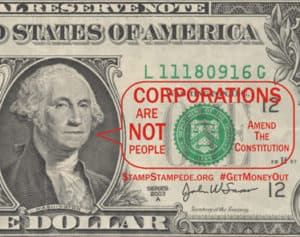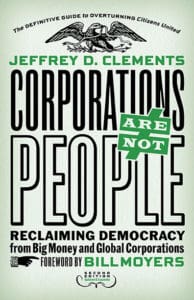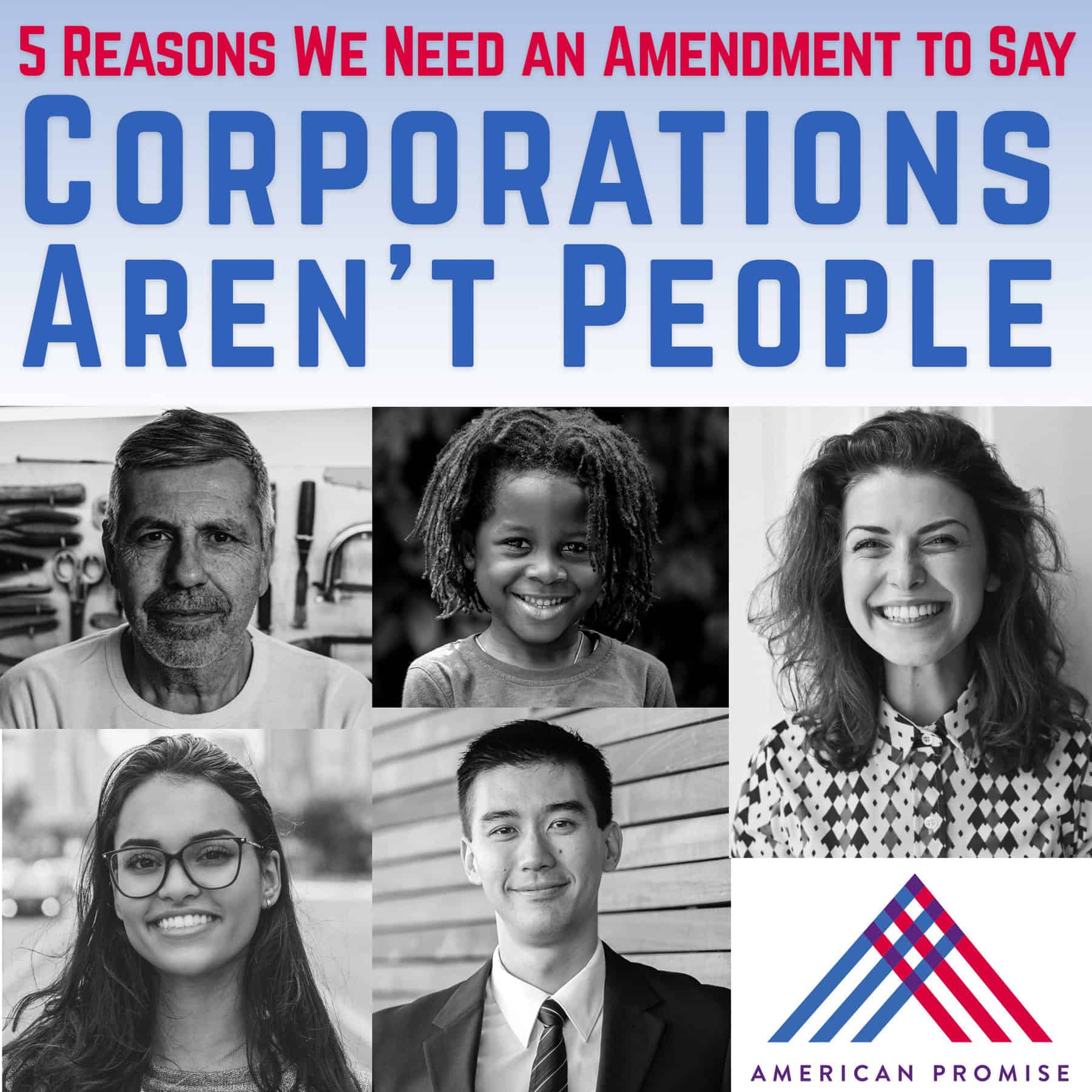“Corporate Personhood” is an umbrella term that refers to the many ways we treat corporations as people under the law. Sometimes this is helpful for how laws are applied—such as when the Clean Water Act prohibiting the dumping of waste materials into waterways is applied to corporations as well as individuals. Other times, however, when this concept is expanded to grant Constitutional rights originally meant for people, it can have anti-democratic and socially destructive consequences.

In a series of decisions over the past 40 years, the Supreme Court has radically expanded Constitutional rights for corporations. Perhaps its most impactful decision on the matter was in the 2010 Citizens United v. FEC ruling, which in a 5-4 decision granted corporations First Amendment rights, ruling that corporate political spending was protected speech. The effects of this decision have unleashed a wave of consequences for our republic, most notably an erosion of the public’s faith in the integrity of our democracy, a lack of policy outcomes that align with the views of most Americans, and a deluge of big money that has drowned our political system.
The Court’s ruling was based on its assertion that corporations deserve these Constitutional protections because they are nothing more than assemblies of people. However, corporations in our society function as distinct entities from the individuals that comprise them, and aren’t beholden to represent the opinions of those individuals. What’s more, with their First Amendment “rights” consecrated by the Supreme Court, corporations have extended these Constitutional rights in other dubious ways.
Most Americans agree that corporations are not people. Throughout our history, citizens have come together to overrule the Supreme Court—for example when it upheld slavery or denied women’s right to vote. Today, we need an amendment again to establish that Constitutional rights are for people, not corporations.
Read on to learn five top reasons we need an amendment to make clear that corporations are not people:
-
Corporations are not simply associations of individuals.
The Citizens United decision argued that because corporations are simply associations or collections of individuals, then corporations should have all the same rights as those people, and that limiting the rights of corporations therefore also limits the Constitutional rights of the individuals who comprise these corporations. But under the law corporations are more than just collections of individuals, as evidenced by the special privileges and rights they attain by incorporating. One example of this is limited liability, which makes a corporation liable for actions while shielding the actual humans behind the corporation.
This doesn’t mean that the people who come together to incorporate give up any rights by doing so. These individuals retain their Constitutional rights as citizens, and in fact these people can also use the corporation to help defend their individual rights through the doctrine of third-party associational standing. However, a corporation, legally and functionally, is an entity distinct from the individuals comprising it.
- Corporations abuse First Amendment free speech rights to wield undue influence in our elections.
The assertion that corporations hold First Amendment Constitutional protections has enabled them to abuse these rights in numerous ways. First, these corporate entities use their ability to accumulate mass quantities of wealth—enabled by their corporate legal structure—to have outsize influence over election and policy outcomes. What’s more, corporations, for which changes in regulatory policy may equate to billions of dollars’ difference to their bottom lines, have unique motivations to support or dispute policy and election outcomes, which may not align with the well-being of the American people. Indeed, corporate interests are often contrary to the interests of the general public, and studies find that elite interests are much more likely to be reflected in policy outcomes than those of the general public.

- Corporations abuse First Amendment rights in other ways.
Since being awarded First Amendment protections by the Supreme Court, corporations have used these rights in ways beyond political spending. For example, in investigations over recent years, Exxon Mobil, the world’s largest oil and gas corporation, was discovered concealing corporate knowledge of its business’ “catastrophic” impact on the health of the planet, while dismissing these claims publicly. In response, the company argued it had a First Amendment right to not speak, and not share this knowledge with the public or regulators. Vox reports on numerous other examples: “In recent years, large corporations have been emboldened to argue that corporate speech rights entitle them to strike down state health care prescription information laws—those forbidding pharmaceutical companies from selling information about the prescribing patterns of individual doctors, for example. They have argued that speech rights forbid certain securities regulations—specifically, those requiring investigation and disclosure of whether a company sells “conflict minerals” from the Democratic Republic of Congo. They have said that the First Amendment gives them a right to decline to say on product labels that the meat they sell comes from foreign countries, or that food products contain genetically modified ingredients.”
- Corporations claim additional Constitutional rights to overturn democratically enacted laws.
Corporations have extended their “Constitutional rights” claim to other amendment rights, as well. For example, corporations have claimed the 4th Amendment right against unreasonable search and seizure to require regulators to obtain a warrant to check for safety violations. Over the years, corporations have successfully claimed Constitutional rights of people—including 4th Amendment rights against unlawful search and seizure, 5th Amendment rights to protect citizens against being unlawfully held for crimes, and 14th Amendment rights—to overturn democratically enacted laws, including worker safety, zoning, tax and other societally beneficial laws. For example, corporations have claimed 14th Amendment equal protection and due process rights to overturn tax and zoning laws meant to encourage locally owned business, restrict multinational big-box stores from developing in small communities, and many others.
- Letting the Supreme Court decide is anti-democratic and encourages judicial activism.
If we agree that corporations should have some legal protections—such as granting a for-profit corporation property rights—but that corporations should not have all the same rights as people, then who should decide which ones they get? If we continue to allow the Supreme Court to make those decisions, we are encouraging an activist Court to make what should be political decisions. Passing an amendment that says corporations aren’t people would put the power in the hands of Americans to decide what rights or privileges various kinds of corporations should have, by passing laws through the political process.
The American people have used the Constitutional amendment process numerous times across our history to reverse Supreme Court decisions not supported by the public. American Promise is leading the way to enable Americans today—nearly 90% of whom agree that big money has too much influence in our democracy—to use the amendment process once more, this time to assert political equality for every American, regardless of wealth.





